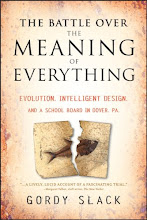 |
| The BMI is our sci-fi obsession. For good reason. |
A good brain-machine interface (BMI) makes everything possible. At least it's the key to good late-model science fiction. "The Matrix's" head plug, through which humans are fed their illusory digital worlds; "Avatar's" less invasive full-body tanning-salon connections and "Surrogate's" EEG-like helmets, through which users connect to their robot proxies; "Inception's" contraption--who the hell knows where that thing plugged in, but it plugged in somewhere;"Eternal Sunshine of the Spotless Mind's" read-write fMRI-like device that could locate and erase memories. All were functional in-out ports to the human brain and so keys to either a) "freeing" the mind from the "constraints" of the body, or b) "enslaving" the mind (and its body) to the controllers of the BMI. Or, more often, both.
A new absorbing and fun BMI-enabled movie, "Source Code," by "Moon" director Duncan Jones, and starring Jake Gyllenhaal, Michelle Monaghan, and Vera Farmiga, plays around with multi-verse theory and free will.
Gyllenhaal plays an army sergeant with an I/O port in his brain that enables him to travel, via the (pretty much unexplained--"it's math"--) "source code," into the recent past to investigate a terrorist plot. Actually, he appears to be traveling through time, but is really traveling through memory. The train explosion that kills him over and over again has already taken place and everyone he meets --including love-interest Monagham--is already dead. He's not supposed to keep the train from exploding--it's too late for that--but to find the perp and avert a bigger, future, nuclear attack.
Like the Bill Murray character in "Groundhog Day," Gyllenhaal has multiple chances to do the job. And like "Groundhog Day," each replay is slightly skewed depending on his perceptions and actions. And finally, like "Groundhog Day"--and like real life--the first reruns are extravagantly spent getting a clue about what kind of world we're dealing with and why it matters. The rest are spent trying to exercise our wills and defy the tyranny of circumstance.
That sounds heavy, but it's a fun, tightly-directed movie, well acted by all three leads. And it's romantic, which is something since the Gyllenhaal and Monaghan characters only have a couple of minutes on the train to work with. And, if you've got any geek in you--and you must if you're reading this--the film's got a fresh parallel-universes theme that will either delight you or push your buttons, depending on your feelings about infinite inflation and multi-verse cosmological models.
It's also realistic in one important way. (Spoiler alert!) The Gyllenhaal character is, in the film's primary universe, actually a locked-in-syndrome paraplegic, a victim of a helicopter crash in Afghanistan; he doesn't know it, but he is "technically dead." A portion of his brain is still vital enough, though, to plug into a BMI, sending his consciousness and body image temporarily into the memories of others. Okay, here's the realistic part: In our world, too, it is patients with disabilities who are having BMIs implanted to let them control wheelchairs, prosthetic limbs, and computer cursors with their thoughts.
Lest you hope (or fear!) just any old port into the brain will function as a USB-like device enabling all kinds of brain apps, it's key to note that reading directional command signals from the motor cortex (which neuroscientist can already do) is a far cry from importing or exporting anything like a complex thought, belief, or memory. The best scientific understanding of what constitutes thoughts, say, is so elementary today that the reality of importing or exporting them from the brain via computer (BMI) is a long way off. Just how long off, though, and just how we might prepare for that day, are important questions worthy of as much scientific, philosophical, ethical, and cinematic attention as we can throw their way.


2 comments:
I loved this movie! I wasn't sure how they'd sustain the repeated trips to relive the same events, but they did - fun movie. Lots of movies about brains these days.
I agree, Duncan Jones did a great job sustaining interest while we essentially saw the same scene over and over. But it's fascinating to see how any little thing Gyllenhaal's character did had ripples of effect that grew as they moved outward.
And yes, there sure are a lot of brain movies these days. Neuroresearch is the science (and science fiction) frontier of our day. 100 years ago, when people imagined the future it was all about space travel. Now its all about tapping into the brain and connecting it to machines.
Post a Comment